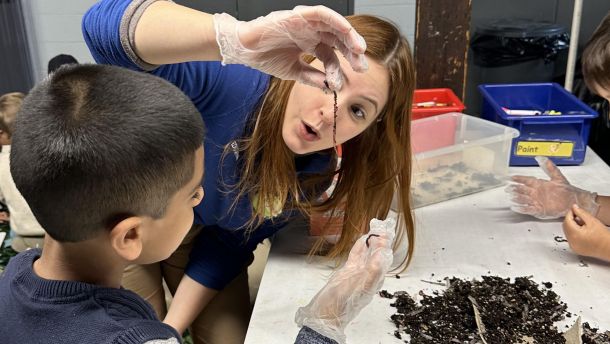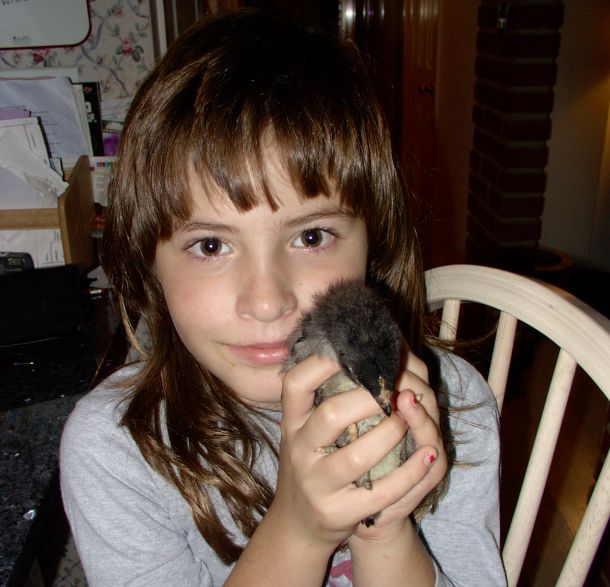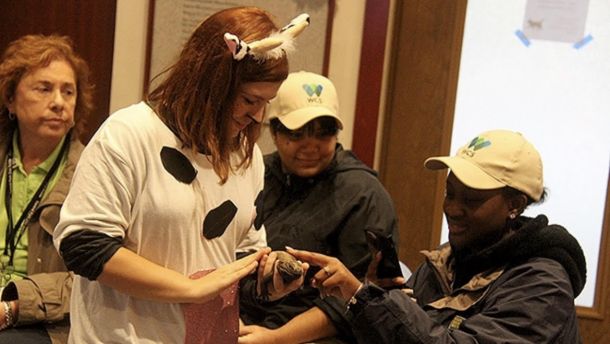Raising Chicks and Future Conservation Leaders | Blog | Nature
This piece comes to us from the Wildlife Conservation Society (WCS). To honor Women’s History Month, WCS and Nature are bringing you stories of women in the fields of nature and conservation.
Early in my professional career, I was introduced to a great Tedx talk by Drew Dudley titled Everyday Leadership. Drew Dudely introduces the concept of “lollipop moments” and the power that seemingly inconsequential interactions can have on the course of a person’s life. Lollipop moments are defined as something someone says or does that makes your life fundamentally better.
When I watched this video during my first week of training, fresh out of college and about to embark on my career in the Education Department at the Central Park Zoo, it made me reflect on the interactions in my life that set me on the path I was about to begin. What were the interactions in my life that influenced the choices I’d made?

Queens Zoo camp explores composting and decomposers through hands-on exploration. Photo credit: ©WCS
One of the most important catalysts for my career in conservation occurred in my 3rd grade science class. Every year that class was given the responsibility of incubating, hatching, and raising chickens.
I was primed to appreciate this opportunity by my family. My mother is an avid animal lover and worked as a veterinary technician. Some of my fondest memories as a child include going on bike rides and seeing wildlife throughout a local park with my father. I was no stranger to nature, but having the opportunity to work hands-on with animals and watch them grow lit a passion within me that never faded.
As part of the 3rd grade project, students were tasked with bringing the newly hatched chicks home for the weekend and keeping a journal of their observations and adventures. The chick’s weekend romp included trips to the grocery store, visits to neighbors, and even a visit to the hair salon.
Overly eager, I took this job extremely seriously and diligently documented my observations over the course of the weekend. When Sunday rolled around, I was devastated that I had to return the chick to school and take an early retirement from my newly established job as an animal caretaker.

Paige, age 8, with a chick hatched during her class incubation project. Photo courtesy Paige Grecco
From then on, I visited the local bird store regularly to observe the animals and bombard the employees with questions. They patiently obliged and the moment I was old enough to get working papers, I got my first job working there. A retail job at a local pet store turned into a seasonal Zoo Keeper position at the Bergen County Zoo and eventually a degree from Rutgers University in Ecology, Evolution, and Natural Resources.
My 3rd grade teacher likely intended her science lesson to be a fun and hands-on activity to complement our learning in the classroom. She unknowingly brought forth a passion in me that was a driving force in developing my career and appreciation for wildlife.
Seven years ago, starting my career at the Wildlife Conservation Society (WCS), I found myself in the position to create my own lollipop moments by nurturing the same excitement and wonder for the natural world in the future campers, program participants, and budding conservation professionals.

Paige demonstrating a chuckwalla for Central Park Zoo staff members. Photo credit: Judith Wolfe ©WCS
My classroom has always been one that welcomes inquiry, fosters empathy, and empowers students to make impactful change. I’ve trekked through muddy Central Park puddles with a merry band of soaked students wading behind and led park clean-ups with teens. At the peak of the covid pandemic, when having a traditional camp was not possible, I led a Zoom screen filled with laughing campers as we navigated a carefully constructed “race” around the world with fun props by my side.
I recently moved into a leadership role at the Queens Zoo as a Program Coordinator and now help other professionals develop their skills as informal educators. As an adult looking back at these memories, it reaffirms the important impact our work can have through building connection with others, sharing experiences with nature, and the impacts environmental educators can have on empowering our participants.


